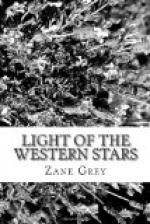“Sure you can gamble on Gene Stewart,” he added.
The night happened to be partly cloudy, with broken rifts showing the moon, and the wind blew unusually strong. The brightness of the fire seemed subdued. It was like a huge bonfire smothered by some great covering, penetrated by different, widely separated points of flame. These corners of flame flew up, curling in the wind, and then died down. Thus the scene was constantly changing from dull light to dark. There came a moment when a blacker shade overspread the wide area of flickering gleams and then obliterated them. Night enfolded the scene. The moon peeped a curved yellow rim from under broken clouds. To all appearances the fire had burned itself out. But suddenly a pinpoint of light showed where all had been dense black. It grew and became long and sharp. It moved. It had life. It leaped up. Its color warmed from white to red. Then from all about it burst flame on flame, to leap into a great changing pillar of fire that climbed high and higher. Huge funnels of smoke, yellow, black, white, all tinged with the color of fire, slanted skyward, drifting away on the wind.
“Wal, I reckon we won’t hev the good of them two thousand tons of alfalfa we was figgerin’ on,” remarked Stillwell.
“Ah! Then that last outbreak of fire was burning hay,” said Madeline. “I do not regret the rancho. But it’s too bad to lose such a quantity of good feed for the stock.”
“It’s lost, an’ no mistake. The fire’s dyin’ as quick as she flared up. Wal, I hope none of the boys got risky to save a saddle or blanket. Monty—he’s hell on runnin’ the gantlet of fire. He’s like a hoss that’s jest been dragged out of a burnin’ stable an’ runs back sure locoed. There! She’s smolderin’ down now. Reckon we-all might jest as well turn in again. It’s only three o’clock.”
“I wonder how the fire originated?” remarked Alfred. “Some careless cowboy’s cigarette, I’ll bet.”
Stillwell rolled out his laugh.
“Al, you sure are a free-hearted, trustin’ feller. I’m some doubtin’ the cigarette idee; but you can gamble if it was a cigarette it belonged to a cunnin’ vaquero, an’ wasn’t dropped accident-like.”
“Now, Bill, you don’t mean Don Carlos burned the rancho?” ejaculated Alfred, in mingled amaze and anger.
Again the old cattleman laughed.
“Powerful strange to say, my friend, ole Bill means jest thet.”
“Of course Don Carlos set that fire,” put in Florence, with spirit. “Al, if you live out heah a hundred years you’ll never learn that Greasers are treacherous. I know Gene Stewart suspected something underhand. That’s why he wanted us to hurry away. That’s why he put me on the black horse of Don Carlos’s. He wants that horse for himself, and feared the Don would steal or shoot him. And you, Bill Stillwell, you’re as bad as Al. You never distrust anybody till it’s too late. You’ve been singing ever since Stewart ordered the vaqueros off the range. But you sure haven’t been thinking.”




